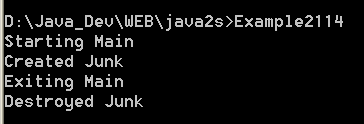demonstrates forced garbage collection 1

/*
Mastering Visual C# .NET
by Jason Price, Mike Gunderloy
Publisher: Sybex;
ISBN: 0782129110
*/
/*
Example21_14.cs demonstrates forced garbage collection
*/
using System;
class Junk
{
public Junk()
{
Console.WriteLine("Created Junk");
}
~Junk()
{
Console.WriteLine("Destroyed Junk");
}
}
public class Example21_14
{
public static void Main()
{
Console.WriteLine("Starting Main");
// create a Junk object
Junk j = new Junk();
// and destroy it
j = null;
// force a garbage collection
GC.Collect();
Console.WriteLine("Exiting Main");
}
}
Related examples in the same category